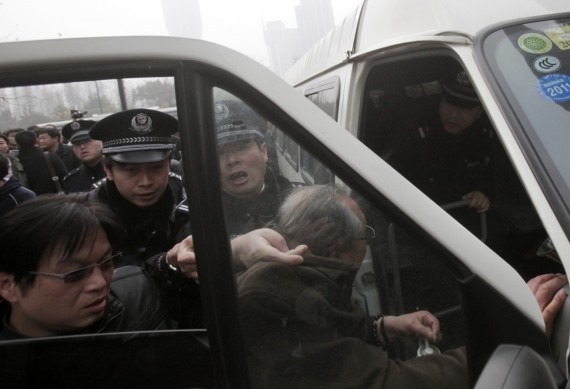China Isn’t Egypt
More on:

So many articles about whether and how China is “like” the Middle East ... But I really wish we wouldn’t compare China and, say, Egypt. They are very different indeed:
- Egypt has had organized opposition in the form of the Muslim Brotherhood and other political and social groups. China does not.
- At least some Arab countries have a mobilized civil society in the form of mosques, charities, Islamic universities, social groups, and so on. China, in the main, does not.
- In many Arab countries, mid- and low-ranked military and security elites may well support the opposition. This is not the case in China. Indeed, where the military in Egypt and Tunisia ultimately turned on their presidents, the People’s Liberation Army will not challenge the Chinese Communist Party under present circumstances, nor will the paramilitary and police forces on which Beijing would largely rely.
- Meanwhile, China has lifted living standards through decades of strong economic performance. Most of the relevant Arab governments have not.
It’s not that China isn’t brittle. It’s just that, over the longer term, prospective sources of instability would, to my mind, reflect distinctly Chinese circumstances only.
China is brittle. It is a country ruled by a party brought to power, in large part, by peasants but cannot suppress rural protest. It is a country with one umbrella labor federation but faces sporadic and unpredictable strikes. Even China’s elite—white collar bankers, who have been among the biggest winners from the country’s growth explosion—have been arrested. Some, for example, were arrested last year for agitating in central Beijing.
But China’s leaders have been effective at blunting the political effects of this discontent through a combination of carrots and sticks. They have co-opted some demands of the discontented, not least by hiking wages and funding social housing. Separately, they have built paramilitary and police capabilities and have been prepared, since the 1989 Tiananmen events, to react (or overreact) to the slightest twitch that smells of an underlying challenge to the regime.
The challenges to China’s political and social stability are real but of a decidedly longer term nature. And the signposts of crisis would probably involve a cascade of short, sharp challenges to the regime—and a fracturing of the governing elite—not, for example, a handful of anonymous individuals trying to organize a “Jasmine” gathering on the corner of Wangfujing Street in Beijing.
China’s government, of course, aims to forestall all this. It will try to address these challenges through many of the policies at the heart of the 12th Five Year Plan. It aims, for example, to shift income from producers to households, to adopt new social welfare schemes, to hike wages, and to root out the most embarrassingly egregious examples of state and Party corruption.
The state is very unlikely to succeed in all of these efforts. But while its failures will raise the risks to China, those risks cannot be measured on an "Egyptian" timetable.
Instead, I wish we would connect events in the Middle East to China in more proximate ways.
For one, inflationary concern in China’s governing elite will surely be aggravated by developments in international energy markets.
For another, the threat to Chinese nationals in Libya has sparked foreign policy debates in Beijing about how to protect Chinese workers abroad. This reinforces a debate that gathered steam after the murder of Chinese engineers in Pakistan in 2006. And, in time, China’s heightened global commercial profile could (gradually) suck Beijing into the domestic politics of third countries. China will increasingly debate whether and how to develop and deploy forces abroad for non-combatant evacuation operations.
But domestically, the most important near term effect may simply be to boost the role of the security services and, especially, to reinforce Beijing’s abiding suspicion of social media and the Internet. The regime will likely become even more assertive on Internet policy, inching China closer to a walled-off web.
More on:
 Online Store
Online Store